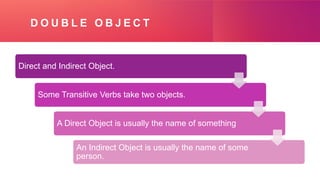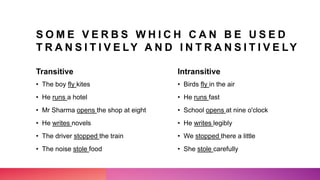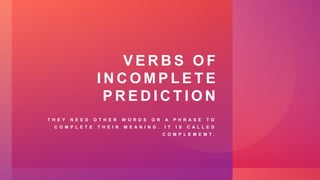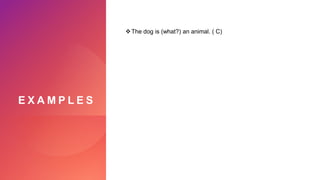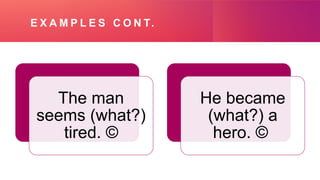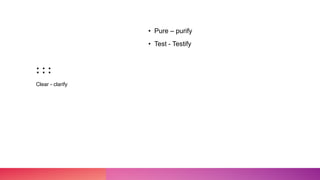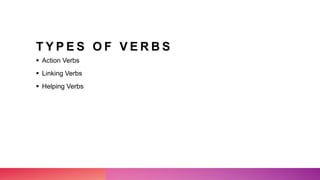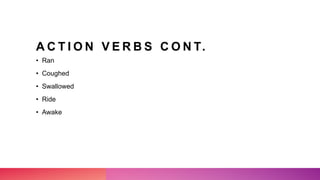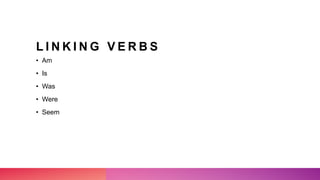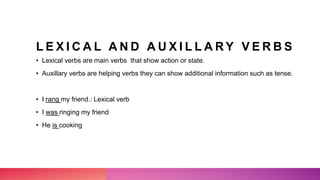Repurposed slides
- 1. A L L Y O U N E E D T O K N O W A B O U T V E R B S L E R A T O N O S I P H O N D W A N D W E
- 2. M E A N I N G O F V E R B A verb is a doing word. It describes actions It shows possession It denotes being also(The verbs to be are â is, am ,are, was, were)
- 3. Transitive Verb âĒ Transitive Verb- A verb that requires an object to complete its meaning, is called a Transitive Verb. âĒ Examples âĒ My mother washes clothes. âĒ Alice made a doll. Intransitive Verb âĒ Intransitive Verb- A verb that doesn't require an object to complete its meaning. âĒ Examples âĒ The baby slept. âĒ The girl smiled. K I N D S O F V E R B S
- 4. T R A N S I T I V E V E R B A N D I N T R A N S I T I V E V E R B Transitive Verbs are action verbs that have an object to receive that action. I bake some cookies I ride the bicycle I move the chair âĒ Intransitive Verbs are action verbs but unlike Transitive Verbs they do not have an object receiving the action âĒ I laugh âĒ I cry âĒ The book falls
- 5. D O U B L E O B J E C T Direct and Indirect Object. Some Transitive Verbs take two objects. A Direct Object is usually the name of something An Indirect Object is usually the name of some person.
- 6. E X A M P L E S âĒ Roshan gave his friend a video game. âĒ She gave a rupee to him âĒ Danish told us a funny story
- 7. Transitive âĒ The boy fly kites âĒ He runs a hotel âĒ Mr Sharma opens the shop at eight âĒ He writes novels âĒ The driver stopped the train âĒ The noise stole food Intransitive âĒ Birds fly in the air âĒ He runs fast âĒ School opens at nine o'clock âĒ He writes legibly âĒ We stopped there a little âĒ She stole carefully S O M E V E R B S W H I C H C A N B E U S E D T R A N S I T I V E LY A N D I N T R A N S I T I V E LY
- 8. V E R B T O B E âĒ Verb to be ( is, am ,are, was, were ,will, be, shall be, appear, seem and look)
- 9. V E R B S O F I N C O M P L E T E P R E D I C T I O N T H E Y N E E D O T H E R W O R D S O R A P H R A S E T O C O M P L E T E T H E I R M E A N I N G . I T I S C A L L E D C O M P L E M E M T .
- 10. A C O M P L E M E N T C O M P L E T E S T H E P R E D I C AT E
- 11. E X A M P L E S ïķThe dog is (what?) an animal. ( C)
- 12. E X A M P L E S C O N T. The man seems (what?) tired. ÂĐ He became (what?) a hero. ÂĐ
- 13. M A I N P A R T S O F V E R B 1. The Present Tense 2. The Past Tense 3. The Future Tense.
- 14. E X A M P L E S
- 15. P R E S E N T âĒ Emma asks questions all the time.
- 16. PA S T ïķEmma asked questions all the time.
- 17. F U T U R E âĒ Emma will ask questions all the time.
- 18. From nouns ïķBath â Bathe ïķBreath â Breathe ïķFood â Feed ïķAction â Act ïķBelief â Believe ïķDeath - Die From adjectives ï§ Able â Enable ï§ Deep â Deepen ï§ New â Renew ï§ Active â Act ï§ Cheerful â Cheer ï§ Hopeful - Hope F O R M AT I O N O F V E R B S
- 19. V E R B S S O M E P R E F I X E S A N D S U F F I X E S C A N A R R A N G E W O R D S I N T O V E R B S
- 20. P R E F I X E S 1. Able - Enable âĒ 2. Courage â Encourage
- 21. P R E F I X E S C O N T. 3. JOY â ENJOY 4. DANGER â ENDANGER
- 22. P R E F I X E S 5. List â enlist 6. Light â enlighten 7. Little â be little Friend â be friend
- 23. S U F F I X E S Broad â broaden Wide â widen Fright â frighten
- 24. S U F F I X E S C O N T. Bright â Brighten Realise â realise Critic â criticise Just - justify
- 25. : : : âĒ Pure â purify âĒ Test - Testify Clear - clarify
- 26. T Y P E S O F V E R B S ï§ Action Verbs ï§ Linking Verbs ï§ Helping Verbs
- 27. A C T I O N V E R B S âĒ An action verb tells what people or things can do. âĒ These are some action verbs âĒ - Play âĒ Write âĒ Scream âĒ Dance âĒ Pick
- 28. A C T I O N V E R B S C O N T. âĒ Ran âĒ Coughed âĒ Swallowed âĒ Ride âĒ Awake
- 29. L I N K I N G V E R B S âĒ Am âĒ Is âĒ Was âĒ Were âĒ Seem
- 30. V E R B P H R A S E S âĒ A phrase is a group of words âĒ A verb phrase is a verb that has more than one verb in it.
- 31. L E X I C A L A N D A U X I L L A R Y V E R B S âĒ Lexical verbs are main verbs that show action or state. âĒ Auxillary verbs are helping verbs they can show additional information such as tense. âĒ I rang my friend.: Lexical verb âĒ I was ringing my friend âĒ He is cooking
- 32. M A I N V E R B âĒ Every complete sentence must have a subject and a main verb.
- 33. Subject âĒ The topic of the sentence Who or What the sentence is about. âĒ The subject is a noun or pronoun Main Verb âĒ The verb in the sentence that shows what the subject does, or shows what state the subject is in. Example "Emily us sad". E X A M P L E S
- 34. R E F E R E N C E S OHasija, S . ( 2014) All About Verbs. Available at /swatihasija All about verbs( Accesssed 17 September 2021). Soni, P. (2008)Action Verbs A project LA Activity.Available at /kakasoni





